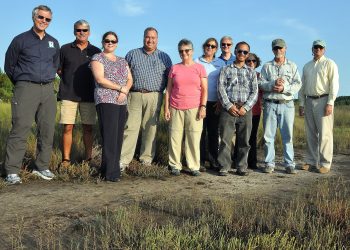
From left to right: Dean Carpenter, APNEP; Mark Smith, North Carolina Coastal Federation; Stacey Feken, APNEP; Jimmy Johnson, APNEP; Rhonda Evans, EPA Region 4; Ellen Gilinsky, EPA Office of Water; Marcus Zobrist, EPA Office of Wastewater Management; Vince Bacalan, EPA Office of Wetlands, Oceans and Watersheds; Joanne Benante, EPA Region 4; Jud Kenworthy, National Oceanic and Atmospheric Administration (NOAA); Bill Crowell, APNEP.
On Sept. 26, a group from the Environmental Protection Agency (EPA) visited coastal North Carolina by invitation from the Albemarle-Pamlico Estuary Partnership (APNEP). The group included officials from EPA headquarters and EPA Region 4. During their tour, the North Carolina Coastal Federation had the opportunity to give them a tour of North River Wetlands Preserve near Beaufort. Todd Miller, executive director of the federation, and Mark Smith, preserve manager, led the tour of the 6,000-acre wetland preservation site.
North River Wetlands Preserve, formerly known as North River Farms, is one of the largest wetland restoration projects in North Carolina and the country. The primary goal of the project is to return farmland back to wetlands in order to improve the water quality of degraded downstream estuaries and reopen these waters for shellfishing.
Joining the tour was Ellen Gilinsky, associate deputy assistant administrator for the EPA Office of Water. Below, Gilinsky talks about her visit to coastal North Carolina and the North River Wetlands Preserve, and reflects on various environmental challenges and opportunities she observed.
What were your impressions of the restoration projects you saw at North River Wetlands Preserve?
The North River Wetlands Preserve is a well-planned and valuable restoration project within the Albemarle-Pamlico Estuary watershed, made possible by a long-term partnership with the North Carolina Coastal Federation. Its size at over 6,000 acres of re-created wetlands, combined with the diversity of habitats provided, allow for significant functions such as wildlife habitat, improvement of water quality through filtering runoff from surrounding lands and groundwater recharge through the extensive plantings, ponds and waterways within the restoration area.
What were your impressions of the work of the North Carolina Coastal Federation, based upon your visit?
A project such as this takes extensive coordination with partners and designers who have onsite knowledge and experience for continued maintenance and upkeep. I am very impressed by the work of the North Carolina Coastal Federation as exhibited by this project and their educational materials and activities held throughout the coastal areas of North Carolina. Education and outreach are so important to continue the message of the need to preserve, restore and protect our fragile coastal environment.
What are some environmental opportunities and/or challenges you recognize based upon your tour of the North Carolina coast?
As with other coastal areas around the United States, the North Carolina coast experiences the pressure of development resulting in a more fragile ecosystem. The impact of climate change on the North Carolina coast is also visible due to the increasing frequency and severity of storm events and flooding.
How do you think EPA’s National Estuary Program and the Albemarle-Pamlico Estuarine Partnership it supports can best address the challenges and opportunities you recognized during your visit?
The National Estuary Program is all about supporting local partnerships like the APNEP to address their local challenges and take advantage of local opportunities to protect these fragile ecosystems while enhancing the local economy. APNEP’s approach to these challenges considers both human and natural systems and involves meaningful engagement with the public to find environmental solutions that benefit the local communities
Specifically, APNEP has identified impacts associated with climate change and sea level rise as an important research component in their Comprehensive Conservation and Management Plan (CCMP). Critical to its success is utilizing its vast network of partners, particularly in universities and research labs throughout the APNEP boundary, to help inform their management board of critical areas most likely to experience the effects of climate change and sea level rise. APNEP and the North Carolina Coastal Federation can also benefit from EPA’s Being Prepared for Climate Change: A Workbook for Developing Risk-Based Adaptation Plans.
To learn more about the North River Wetlands Preserve, please contact Todd Miller or Mark Smith at 252-393-8185.
